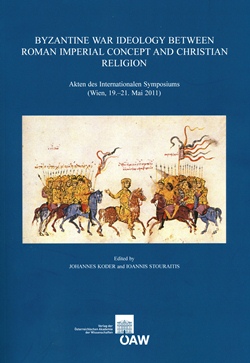
Heiliger Krieg und gerechter Krieg sind leider nicht nur Schlüsselworte für obsolete Irrwege in der Vergangenheit, sondern ebenso auch für Probleme der Gegenwart. Dies gilt auch für die Versuche der Machthaber, den Krieg staats- bzw. herrscherideologisch, aber auch religiös zu rechtfertigen, sei es aus Überzeugung oder, um wirtschaftliche und machtpolitische Interessen zu verdecken. Der vorliegende Band fasst die Ergebnisse einer Arbeitstagung zusammen, zu der die Herausgeber Johannes Koder und Ioannis Stouraitis im Mai 2011 nach Wien einluden. Das Symposium stand im Kontext eines Forschungsprojektes über das Thema „Holy War? A study on Byzantine perceptions and concepts of war and peace in the period from the late 11th to the early 13th century”, das am Institut für Byzantinistik und Neogräzistik der Universität Wien beheimatet ist. Der Bogen der Beitragsthemen spannt sich zeitlich vom 7. bis zum 15. Jahrhundert und thematisch von der christlichen und islamischen Kriegsrechtfertigung („Kreuzzug“, „Heiliger Krieg“) über die spätantike und mittelalterliche Kaiserideologie bis zu den Motivationen, die den Soldaten und den zivilen Bevölkerungen angeboten bzw. oktroyiert wurden, um sie für das mit Krieg verbundene Leid, die Opfer und die Entbehrungen gefügig zu machen: Die Versprechungen diesseitigen Gewinnes stehen dabei der Verheissung von Belohnungen im Jenseits gegenüber. Die Ergebnisse – viele sind neu, manche überraschend – beziehen sich vordergründig auf das Mittelalter und seine spätantiken geistigen Grundlagen und sind in ihrer kritischen Hinterfragung der ideologischen Grundlagen des Krieges doch von erstaunlicher Aktualität.
Holy war and just war are unfortunately not only keywords for recondite excursions into the past, but equally for problems of the present. This applies as well for the attempts of rulers to justify war through state or ruling ideology but also on religious grounds, whether from conviction or in order to cloak economic and political interests. The present volume summarizes the results of a conference held in Vienna, which the editors, Johannes Koder and Ioannis Stouraitis, hosted in May of 2011. The symposium was held in the context of a research project with the topic “Holy War? A study on Byzantine perceptions and concepts of war and peace in the period from the late 11th to the early 13th century.” This project was housed at the Institute for Byzantine and Modern Greek Studies at the University of Vienna. The arc of the presentation topics spanned chronologically from seventh to the fifteenth century and thematically from the Christian and Islamic legitimation of war (“crusade”, “holy war”) to late antique and medieval imperial ideology to the motivations which were offered or imposed upon soldiers and civilian populations in order to make them amenable to the sorrow, sacrifices and privations which are the accompaniments of war: the promises of worldly rewards were complemented by the expectation of recompense in the afterlife. The results—many are new, some surprising—at one level reference the medieval period and its late antique intellectual foundations and are yet, in their critical evaluation of the ideological basis of war, of astonishing contemporary relevance.
2012,
978-3-7001-7307-6
978-3-7001-7375-5
137 Seiten, zahlreiche Abb.,
29,7×21cm, broschiert